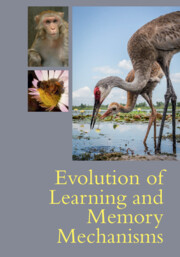Book contents
- Evolution of Learning and Memory Mechanisms
- Evolution of Learning and Memory Mechanisms
- Copyright page
- Contents
- Figures
- Tables
- Contributors
- Preface
- Introduction
- Part I Evolution of Learning Processes
- 1 Learning and Memory in the Nematode Caenorhabditis elegans
- 2 Adaptive Evolution of Learning and Memory in a Model Lineage
- 3 Learning in Insects: Perspectives and Possibilities
- 4 Experimental Evolution and Mechanisms for Prepared Learning
- 5 Evolutionary Processes Shaping Learning Ability in Insects
- 6 Brain and Spatial Cognition in Amphibians
- 7 Pavlovian Conditioning, Survival, and Reproductive Success
- 8 Compensatory Responses to Wildlife Control
- 9 Relational Memory Functions of the Hippocampal Pallium in Teleost Fish
- 10 Mechanisms Underlying Absolute and Relative Reward Value in Vertebrates
- 11 The Optimality of “Suboptimal” Choice
- 12 A Behavior Systems Framework
- 13 Dissociable Learning Processes
- 14 Social Learning Strategies
- 15 How Learning Affects Evolution
- Part II Evolution of Memory Processes
- Index
- References
10 - Mechanisms Underlying Absolute and Relative Reward Value in Vertebrates
from Part I - Evolution of Learning Processes
Published online by Cambridge University Press: 26 May 2022
- Evolution of Learning and Memory Mechanisms
- Evolution of Learning and Memory Mechanisms
- Copyright page
- Contents
- Figures
- Tables
- Contributors
- Preface
- Introduction
- Part I Evolution of Learning Processes
- 1 Learning and Memory in the Nematode Caenorhabditis elegans
- 2 Adaptive Evolution of Learning and Memory in a Model Lineage
- 3 Learning in Insects: Perspectives and Possibilities
- 4 Experimental Evolution and Mechanisms for Prepared Learning
- 5 Evolutionary Processes Shaping Learning Ability in Insects
- 6 Brain and Spatial Cognition in Amphibians
- 7 Pavlovian Conditioning, Survival, and Reproductive Success
- 8 Compensatory Responses to Wildlife Control
- 9 Relational Memory Functions of the Hippocampal Pallium in Teleost Fish
- 10 Mechanisms Underlying Absolute and Relative Reward Value in Vertebrates
- 11 The Optimality of “Suboptimal” Choice
- 12 A Behavior Systems Framework
- 13 Dissociable Learning Processes
- 14 Social Learning Strategies
- 15 How Learning Affects Evolution
- Part II Evolution of Memory Processes
- Index
- References
Summary
In his Nichomachean ethics, Aristotle suggested that absolute judgments precede relative judgments. This chapter places this notion in an evolutionary context by centering on comparative research on successive negative contrast (SNC). SNC occurs when a downshift from a more preferred to a less preferred reward deteriorates behavior. SNC is observed in experiments with mammals, but not in experiments with goldfish (bony fish), toads (amphibian), or turtles (reptile). Pigeons and starlings (birds) have produced a mixed set of results. Since E. L. Thorndike, an understanding of animal learning has been influenced by the notion that rewards strengthen behavior and nonrewards weaken behavior — the strengthening/weakening principle.Outcomes fitting this principle provide evidence of control by absolute reward value, whereas results that violate this principle, like SNC, suggest control by relative reward value. Comparative research suggests that absolute reward effects are more general than relative reward effects.
Keywords
Information
- Type
- Chapter
- Information
- Evolution of Learning and Memory Mechanisms , pp. 176 - 192Publisher: Cambridge University PressPrint publication year: 2022
References
Accessibility standard: Unknown
Why this information is here
This section outlines the accessibility features of this content - including support for screen readers, full keyboard navigation and high-contrast display options. This may not be relevant for you.Accessibility Information
- 2
- Cited by
